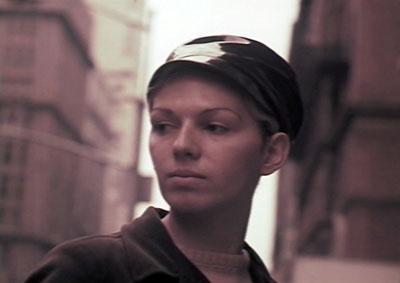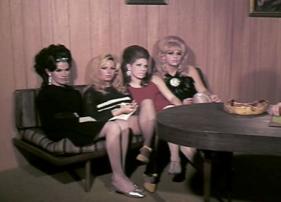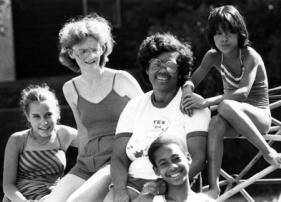These three, separate film rarities highlight the diversity of representations offered in the Outfest UCLA Legacy Project, a joint effort of Outfest and UCLA Film & Television Archive to preserve moving image artifacts documenting the lives of lesbian, gay, bisexual and transgender peoples.
An extraordinary bit of ephemera, the proto-scientific documentary Queens at Heart presents four male-to-female transsexuals from New York City in candid discussion with an onscreen interviewer about their lives and identities. Digitally restored to its vivid, original hues from two faded 16mm projection prints, the curious and moving short bursts not only with new color, but with human dignity. The four subjects gamely respond to probing questions about their private lives and sexual practices. Their answers provide an extremely rare glimpse of the vernacular surrounding gender and sexuality of the time. The film also provides an interesting portrait of Americans on the fringes of gender identity just before the Stonewall Rebellion, which would be two years in coming.
The amateur film Mona’s Candle Light is among a relatively small number of films depicting gay people before gay liberation. Among the most perennial and plentiful of such moving images are representations of “Pride” parades, “Gay Freedom Day” celebrations, and other such public events. This brief film, discovered at a flea market, and depicting patrons of a lesbian bar (in San Francisco circa 1950) represents an exceedingly rare example of queer life on its own turf, and on its own terms. Deceptively simple, and all-too-brief, it depicts onstage performances at the titular bar, identified by a neon sign. Two performers, drag king Jimmy Reynard and singer Jan Jensen, sing the American standards “I’ll Remember April,” “It Was Just One of Those Things,” and “Tenderly.” Décor, makeup and hairstyles have contributed to the dating of the otherwise unidentified material which, though slight (and almost lost to history) presents rare visible evidence of a subculture rarely seen or acknowledged.
In a time when the topic of gay parenting has assumed a central position in LGBT culture and discourse, and is not unknown in the mainstream, it is remarkable to remember that images of lesbian and gay parents were only recently almost unimaginable. Debra Chasnoff’s and Kim Klausner’s groundbreaking documentary, Choosing Children, broke this barrier with grace and towering authority, presenting portraits of several lesbian mothers who were among the first to make the historic choice to become parents. Interviewed for the most part in their home settings, with their families, the women featured in the film share intimate details about parenting, familial structures and support systems, and about working to build a better future for their kids. Free from didacticism, the film exerts a powerful emotional undertow, making the viewer almost a part of the family. Also remarkable is the attention paid to women of various socioeconomic strata and ethnicities, such that the portrait is not one of bourgeois comfort posing as normalcy, but of family life as an arena of love, commitment and work.
Shannon Kelley






 Mobile Navigation
Mobile Navigation



